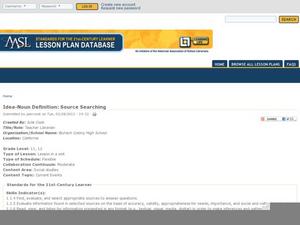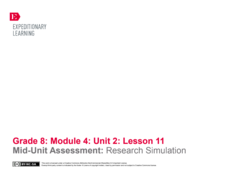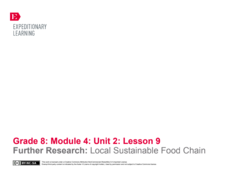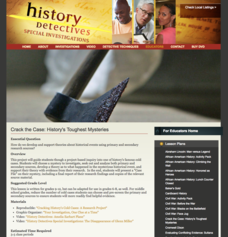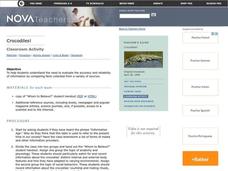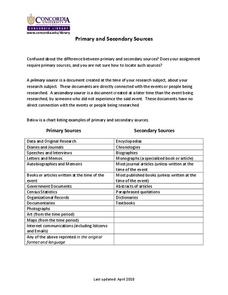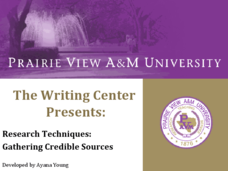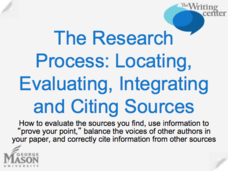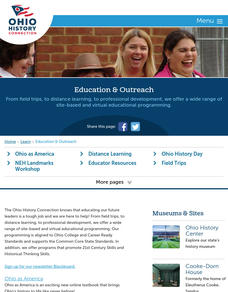Curated OER
1900 America: Primary Sources and Epic Poetry
Using Walt Whitman's Song of Myself and Hart Crane's The Bridge as models, class groups first craft their own epic poems for 1900 and, using primary sources, create a multi-media presentation that captures the sights and sounds of life...
Curated OER
Idea-Noun Definition: Source Searching
A great idea for showing language arts pupils the universality of themes, even in the real world! Have class members choose an idea-noun (peace, justice, war, love, etc.) at the beginning of the year or semester. They complete weekly...
Virginia Department of Education
Researching and Narrowing Topics
Internet research is becoming more common, so why not conduct an online research project in your classroom? Use this resource to get you and your class started. The lesson includes basic instructions and a list of questions to help...
Curated OER
Research Projects in Renewable Energy for High School Students
Thirty-eight pages of information prepares you to assign middle or high schoolers a project on sustainable energy. They take a pretest, review the scientific method, conduct background research, and finally choose an experiment to carry...
EngageNY
Gathering Information about Water Management: Assessing and Reading Internet Sources, Day 1
It takes time to discover what makes a source accurate and credible. Using everything they've learned about source credibility, scholars begin researching supporting questions about how industry and agriculture manage water. They select...
EngageNY
Gathering Information about Water Management: Assessing and Reading Internet Sources, Day 2
Accuracy, credibility, timeliness ... it's time to act on source reliability! Pupils continue conducting Internet research, selecting two questions about water management from their researcher's notebooks that they want to explore...
EngageNY
Using Search Terms for Further Research: Industrial Organic Food Chain
Class members conduct independent research to continue examining the consequences of the industrial organic food chain from Michael Pollan's The Omnivore's Dilemma. Pupils learn about source credibility and effective search terms, then...
EngageNY
Gathering Information about Screen Time: Assessing and Reading Internet Sources, Day 2
Calling all researchers! Using the resource, scholars continue conducting independent Internet research about a chosen research question. As they browse the web in search of articles to answer their questions, pupils paraphrase their...
K20 LEARN
Street Cred: Evaluating Sources
A lesson on evaluating sources of information teaches scholars to "think twice" before using a source. Researchers examine a resource's home page, author, and sponsor, as well as the date published and the documentation provided.
EngageNY
Mid-Unit Assessment: Research Simulation
As part of a mid-unit assessment, scholars complete a research simulation about food deserts to mimic the research process. Afterward, they engage in a think-pair-share to discuss what they've learned throughout the unit.
EngageNY
Further Research: Local Sustainable Food Chain
Researchers review how to create citations, find reliable sources, and paraphrase. Next, using guided task cards and their researcher's notebooks, they investigate the question they developed in instructional activity eight about the...
Curated OER
Gathering, Evaluating,and Organizing Information for a Research Report
It's never too early to build research skills! Students locate information relevant to a subject they are doing a research project on. They take notes and sort the information under main topic headings. Through research, they gain an...
PBS
Crack the Case: History's Toughest Mysteries
Young sleuths don their trench coats, tip their fedoras, and grab their notepads to investigate one of four famous unsolved mysteries. After examining multiple primary and secondary sources related to their cold case, they propose a...
Digital Public Library of America
Teaching Guide: Exploring Little Women
Louisa May Alcott's Little Women is a literary masterpiece as well as a timestamp of the formative mid-nineteenth century in America. Using a primary source set of photographs, letters, and portraits, readers discuss the ways...
Curated OER
Crocodiles
Work on research procedures in this lesson, which prompts writers to collect and evaluate information pooled from a number of sources. They work in teams to collect information about crocodiles from different sources. They compare the...
Briscoe Center for American History
Identifying Primary Source Documents
Who is Mary Maverick and why is she important? the focus of this, the second in a series of five lessons that are designed to introduce middle schoolers to how historians use primary source documents to understand the past, is on how to...
Concordia University
Primary and Secondary Sources
Show your class the difference between primary sources and secondary sources. The first page provides a list of examples of each type of source. While they research, pupils can refer back to the list quickly to make sure they are reading...
Curated OER
Research Techniques: Gathering Credible Sources
How can you spot a credible source? What even makes a resource reliable in the first place? Answer some of these questions with this presentation. Although intended for higher education, this PowerPoint could be modified for middle...
Curated OER
Research Skills: Evaluating Information and Sources
While this focuses on Ancient Rome, the objectives are improved research and information evaluation skills. In one class period, class members narrow their topic, research it, select the best information, log useful sources, and discuss...
Curated OER
The Research Process: Locating, Evaluating, Integrating, and Citing Sources
Planning on assigning a research project to a high school or college class? Although text-heavy, the concise explanations, color-coded examples, and writing tips included in this presentation make in worth a preview.
Curated OER
Research Skills: Information Retrieval and Evaluation
Focus on research skills, specifically identifying key words and concepts on a specific topic and evaluating information for relevance and authority. This is part of a multi-step lesson on Ancient Rome; however, it is useful for any...
Curated OER
Researching Skills: Researching on the Web
How do researchers narrow their searches so that they get the most useful and accurate information available? This essential question is at the heart of the activities suggested by a research skills worksheet. Tips include how to craft...
Curated OER
Using Primary Source Documents
Students examine copies of primary source documents and determine the document's value to a researcher. They analyze and evaluate the document for bias or contradiction. They know the difference between a primary and secondary source.
Curated OER
Worksheet for Choosing a Research Paper Topic & Developing a Thesis Statement
How do you choose a research topic? This helpful graphic organizer is provided to aid middle and high schoolers in organizing their initial thoughts and choosing a topic. They have to narrow their topic by culture, time frame, event,...
Other popular searches
- Historical Research Sources
- Reliable Sources in Research
- Research Sources Credible
- Evaluating Sources Research
- Validating Research Sources
- Reliable Research Sources
- Documenting Research Sources
- Authoritative Research Sources



